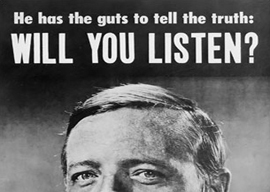
April 12, 2012

William F. Buckley Jr. circa 1965
Be a bad Samaritan! Setting aside the hordes of lunatics who descended on the piece, among thoughtful and largely sympathetic commentators”the only ones I give a fig about”the item of advice most often objected to was:
(10h) Do not act the Good Samaritan to blacks in apparent distress, e.g., on the highway.
Christians thought this un-Christian, but even people commenting from no religious position thought it was unkind and constituted poor citizenship.
I’m going to do a bit of “on-the-one-hand, on-the-other” havering here. You ready to wobble?
On one hand, I wish I had elaborated some on that, to the effect that in view of not-uncommon outcomes such as the one to which I linked, you just need to be a whole lot more wary about acting the Good Samaritan when the distressed traveler is black (even if you yourself are black). One can think of cases where you should act anyway, but in most situations, I’d still recommend double caution.
On the other hand, the context here is advice to kids. Deciding which situation says, “Stay out of this!” and which says, “Help the guy” requires an act of judgment. Kids don’t have very good judgment; so a blanket “Stay out of this!” is not bad advice in context.
Statistical common sense. Readers, even quite friendly and intelligent ones (maybe an IWSB or two”who knows?) emailed in to say things such as: “I live in a heavily black neighborhood, and things are just fine, never any trouble.”
I don’t doubt it. Of course there are nice black neighborhoods. That misses my point about statistical common sense. A white person who finds himself in a neighborhood about which he knows nothing except that it is heavily black is more likely to encounter trouble than he would in some strange neighborhood not heavily black.
Likewise, if your stretch of beach is suddenly flooded by a swarm of black people, it might be a local convention of the Association of Black Cardiologists taking a break. But this is not very likely.
I don’t know why people have so much difficulty thinking statistically, as we behave statistically all the time. The sky is overcast; I have to go out to an event where I’ll be in the open; I take an umbrella. If, after all, it does not rain, do I feel like an idiot for having taken the umbrella? Of course not. I yielded to my inner statistician. I went with the percentages. We all do it a dozen times a day. It’s statistical common sense. The trouble-free black neighborhood is the rain-free overcast day: It happens a lot, but take that umbrella.
Hypotheses non fingo. Lefty commenters waxed large on my piece as promoting eugenics, arguing for genetic inferiority, and so on.
Now, I do have opinions about eugenics. I support, for example, the eugenic requirements in the marriage laws of my state (see under “Familial Restrictions” here.)
Similarly, I have opinions about the notion of genetic success (as I prefer to frame the issue). In the long biological view, the only criterion is survival. The humble sea cucumber, which has been around for 400 million years, is a “superior” organism”more successful”than the saber-toothed tiger, which I don’t think lasted even one million. Likewise, the premise of the movie Idiocracy is that coarse, dumb people will inherit the Earth by out-breeding refined, smart people. If that happens (and I wouldn’t be surprised) then from a biological perspective, which is actually my own perspective as a stone-cold empiricist, the coarse, dumb people will have proven “superior” to the refined, smart ones. Personally I prefer the latter type, but Ma Nature doesn’t care what I prefer.
Sure, I have opinions; sure, I’m willing to discuss these topics. There was nothing of them in my piece, though. I just stated facts, based on statistics gathered over decades, by both private and government agencies, accumulated and checked beyond the range of dispute. Those facts might have any of several causes, with corresponding remedies. They might be “cultural”: Perhaps a nationwide ban on rap music and malt liquor might change them. They might be biomedical, fixable by some not-yet-discovered pharmacological wonder we could put in the water supply such as fluoride. They might be manipulated by extraterrestrial powers lurking in the fogs of Jupiter, beaming malign rays at us. I didn’t speculate. I framed no hypotheses. Just the facts.
Best of the hostiles? Somebody asked whether there were any hostile pieces that I thought made good points, with logic and style, against mine.
I couldn’t say. I don’t read stuff hostile to me; never have, unless paid time and a half for my trouble. You can call that arrogance if you like, or cowardice. The way I look at it is: Why invite indigestion?
Best of the non-hostile critiques? Were there any reasoned non-hostile critiques I thought were good?
Even there, I only looked at three or four, at the urging of friends. Of those, the best was Noah Millman‘s. It deserves a formal, collegial rebuttal, but I’m so far behind with absolutely everything, I daren’t think about it. I haven’t done my damn TAXES yet. Sorry, Noah. In any case, most of the points I’d make are already there in the comment thread to Noah’s piece.
Would I like to offer some kind of sniveling apology for the piece? In your dreams, pal. I haven’t sniveled since about 1952, and I’m too old to reacquire the habit.
I say what I think, and I’m very much obliged to Taki’s Mag for letting me do so. If you don’t like the kinds of things I say, there is a very simple remedy available to you: Don’t read me.
And here’s the pesky word limit again, w-a-a-y back in the rearview mirror in fact. I may return to this topic another time. Then again, I may not.